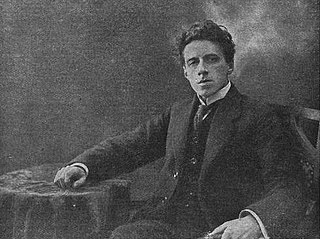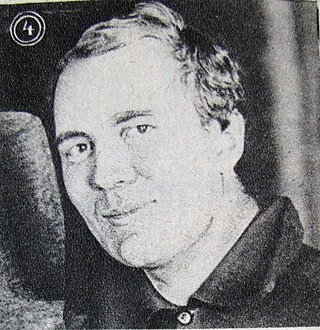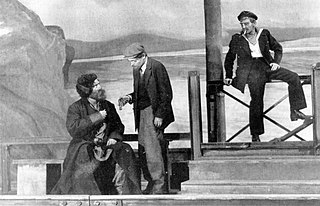
Dmitri Dmitriyevich Shostakovich was a Soviet-era Russian composer and pianist who became internationally known after the premiere of his First Symphony in 1926 and thereafter was regarded as a major composer.
Community theatre refers to any theatrical performance made in relation to particular communities—its usage includes theatre made by, with, and for a community. It may refer to a production that is made entirely by a community with no outside help, or a collaboration between community members and professional theatre artists, or a performance made entirely by professionals that is addressed to a particular community. Community theatres range in size from small groups led by single individuals that perform in borrowed spaces to large permanent companies with well-equipped facilities of their own. Many community theatres are successful, non-profit businesses with a large active membership and, often, a full-time staff. Community theatre is often devised and may draw on popular theatrical forms, such as carnival, circus, and parades, as well as performance modes from commercial theatre. This type of theatre is ever-changing and evolving due to the influences of the community; the artistic process can often be heavily affected by the community's socioeconomic circumstances.

Agitprop refers to an intentional, vigorous promulgation of ideas. The term originated in the Soviet Union where it referred to popular media, such as literature, plays, pamphlets, films, and other art forms, with an explicitly political message in favor of communism.

Aram Ilyich Khachaturian was a Soviet Armenian composer and conductor. He is considered one of the leading Soviet composers.

The Nose, Op. 15, (Russian: Нос, romanized: Nos is Dmitri Shostakovich's first opera, a satirical work completed in 1928 based on Nikolai Gogol's 1836 story of the same name.
The Song of the Forests, Op. 81, is an oratorio by Dmitri Shostakovich composed in the summer of 1949. It was written to celebrate the forestation of the Russian steppes following the end of World War II. The composition was essentially made to please Joseph Stalin and the oratorio is notorious for lines praising him as the "great gardener", although performances after Stalin's death have normally omitted them. Premiered by the Leningrad Philharmonic under Yevgeny Mravinsky on 15 November 1949, the work was well received by the government, earning the composer a Stalin Prize the following year.

Vsevolod Emilyevich Meyerhold was a Russian and Soviet theatre director, actor and theatrical producer of German descent. His provocative experiments dealing with physical being and symbolism in an unconventional theatre setting made him one of the seminal forces in modern international theatre.
A political drama can describe a play, film or TV program that has a political component, whether reflecting the author's political opinion, or describing a politician or series of political events.

The Blue Blouse was an influential agitprop theatre collective in the early Soviet Union. Boris Yuzhanin created the first Blue Blouse troupe under the auspices of the Moscow Institute of Journalism in 1923. Their example encouraged similar workers' theatre companies across the country and worldwide; by 1927 there were more than 5,000 Blue Blouse troupes in the Soviet Union with more than 100,000 members. In the autumn of that year, the original troupe began a tour in Erwin Piscator's theatre in Berlin that provoked a rapid growth of agitprop troupes across Weimar Germany.
Ideological repression in the Soviet Union targeted various worldviews and the corresponding categories of people.

The League for Proletarian Culture was a short-lived German left-wing organisation for the promotion of proletarian culture. It was founded in Berlin in spring 1919 by Alfons Goldschmidt, Arthur Holitscher, and Ludwig Rubiner and was dissolved in early 1920. It sought to promote "the eternal values bequeathed by the illustrious spirits of the past."

Adrian Ivanovich Piotrovsky was a Russian Soviet dramaturge, responsible for creating the synopsis for Sergei Prokofiev's ballet Romeo and Juliet. He was the "acknowledged godfather" of the Workers' Youth Theatre.

Armoured Train 14–69 is a 1927 Soviet play by Vsevolod Ivanov. Based on his 1922 novel of the same name, it was the first play that he wrote and remains his most important. In creating his adaptation, Ivanov transformed the passive protagonist of his novel into an active exponent of proletarian ideals; the play charts his journey from political indifference to Bolshevik heroism. Set in Eastern Siberia during the Civil War, it dramatises the capture of ammunition from a counter-revolutionary armoured train by a group of partisans led by a peasant farmer, Nikolai Vershinin. It is a four-act play in eight scenes that features almost 50 characters; crowd scenes form a prominent part of its episodic dramatic structure. Near the end of the play a Chinese revolutionary, Hsing Ping-wu, lies down on the railway tracks to force the armoured train to stop.
The Left Column was an agitprop theater troupe during the 1920s and 1930s. The troupe worked in support of the Workers International Relief (WIR). During the Nazi era, some of the group went into exile in the Soviet Union, where some of the members were arrested by the Soviet secret police in the Great Purge and in connection with the Hitler Youth Conspiracy.

Helmut Damerius was a German communist, theatre director, writer and the founding member of the Left Column, an agitprop theater group. As the Nazi Party gained in strength, he went into exile in Moscow, only to be arrested in the so-called Hitler Youth Conspiracy and sentenced to a long term in a Soviet prison. After his prison sentence, he was banished to Kazakhstan and was not permitted to move elsewhere. In 1956, he received permission to move to East Germany, where he stayed until his death.
Marina Frolova-Walker FBA is a Russian-born British musicologist and music historian, who specialises in German Romanticism, Russian and Soviet music, and nationalism in music. She is Professor of Music History at the University of Cambridge and Director of Studies in Music at Clare College, Cambridge. In June 2019 it was announced that she would be the 36th Professor of Music at Gresham College. She has authored several books and a number of academic articles.
The Great Friendship is a 1947 opera by Vano Muradeli, to a libretto by Georgi Mdivani. It was premiered in Donetsk on 28 September 1947 and given its Moscow premiere at the Bolshoi Theatre, on 7 November 1947. Joseph Stalin attended a performance at the Bolshoi on 5 January 1948, and strongly disapproved of the opera. This led to a significant purge, often referred to as the Zhdanovshchina, of the musical life of the Soviet Union.
The Unforgettable Year 1919, Op. 89a, is a suite of music adapted from the score written by Dmitri Shostakovich for the 1951 film of the same name directed by Mikheil Chiaureli. The suite was arranged from the film score by Lev Atovmyan (1901-1973) in 1954.

The Five Fragments, Op. 42 is a suite for small orchestra composed on June 9, 1935, by Dmitri Shostakovich. It was the only work, apart from film music, that he composed that year. He approached it as preparatory work for the composition of the final version of his Symphony No. 4.

The Decembrists is an historical opera by Yuri Shaporin with libretto by Vsevolod Rozhdestvensky, Aleksey Tolstoy and others. It was premiered in 1953 after a long and difficult period of composition lasting some 30 years. In a style highly reminiscent of the great 19th-century Russian composers, especially Borodin, Mussorgsky and Tchaikovsky, it gives a rather fictionalized account of the 1825 Decembrist revolt of Russian army officers against the Tsarist government. Frequently performed in the Soviet Union, where it was seen as the culmination of Shaporin's career, it has never been well known in the West except through its most popular number, the Soldiers' Chorus.












